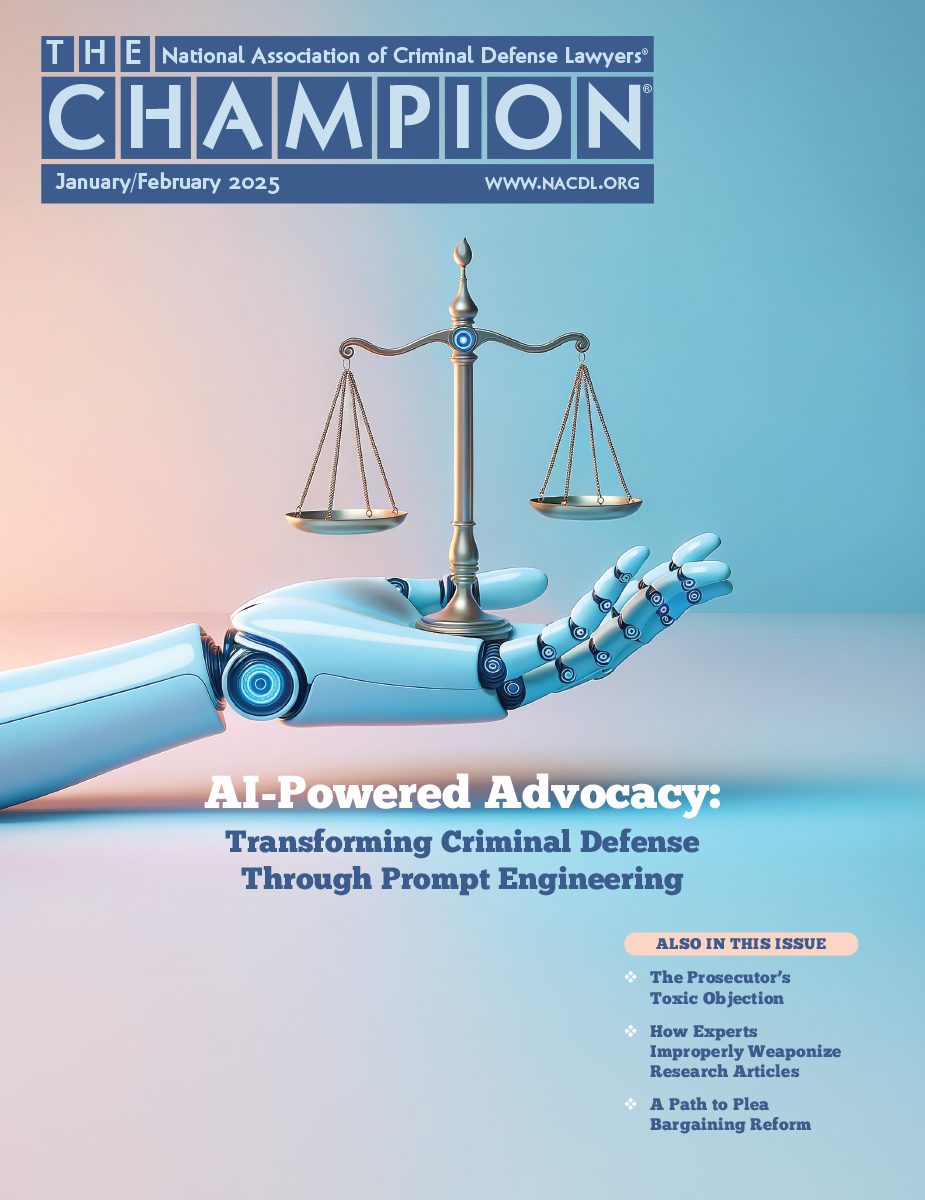January/February 2025

How can a defense attorney use artificial intelligence to help deselect a jury, argue a motion, or prepare for a sentencing hearing?
Articles in this Issue
-
A Principled Path to Plea Bargaining Reform
Plea bargaining began as a shadowy concept prohibited by the common law, but it became a force dominating the legal system. Professor Lucian Dervan explains the costs of plea bargains and discusses recommendations to repair the system.
-
Affiliate News
What events are NACDL affiliates hosting this month? Find out here.
-
AI-Powered Advocacy: Transforming Criminal Defense Through Prompt Engineering
How can lawyers use artificial intelligence on a daily basis? Patrick Barone explains how defense attorneys can use “audience persona prompts” to enhance communication when deselecting a jury, arguing a motion, or preparing for a sentencing hearing.
-
Book Review: Everyone Against Us by Allen Goodman
This month Jon M. Sands reviews Everyone Against Us: Public Defenders and the Making of American Justice by Allen Goodman.
-
Book Review: Principles of Investigative Documentation, 2nd Edition by Philip Becnel, et al
This month Jessica A. Horani reviews Principles of Investigative Documentation, Second Edition by Philip Becnel, Scott J. Krischke, and Alexandra K. Becnel.
-
Book Review: The Digital Fourth Amendment by Orin Kerr
This month John Wesley Hall reviews The Digital Fourth Amendment: Privacy and Policing in Our Online World by Orin Kerr.
-
Five Ways Experts Improperly Weaponize Research Articles
in Purported Sexual Assault and Strangulation Cases
In criminal case report writing and testimony concerning allegations of sexual abuse or strangulation, experts have misused research statistics and findings to bolster opinions that wrongfully suggest that scientific research backs their conclusion. Tristan Wristen describes how experts improperly “weaponize” research articles.
-
From the President: Expanding the Pardonocracy
It has always been a presidential prerogative to pardon or commute federal sentences. Here is a modest proposal: What if all federal convictions were reviewed for pardons? Thousands of deserving people might receive an opportunity to reenter and participate in society.
-
NACDL News: 100,000 Subscribers and Counting: NACDL Takes Over YouTube!
NACDL News for January/February 2025
-
NACDL News: Here Comes the Judge: Former NACDL Board Member Ascends to the Bench in Cook County
NACDL News for January/February 2025
-
NACDL News: NACDL Issues Statement on Election of Donald Trump as 47th President
NACDL News for January/February 2025
-
NACDL News: Seven Elected to Serve on the NACDL Board of Directors
NACDL News for January/February 2025
-
Pozner on Cross: Neural Coupling
How Chapters Allow Jurors to Experience the Dominant Emotion of the Defense
As a person tells a story, the listener’s brain waves synchronize with those of the storyteller. Storytelling activates the part of the brain that predicts motivations, emotions, and beliefs about other people. Chapters allow jurors to experience the dominant emotion of the defense.
-
Sentencing: After Third Circuit Decision, USSC Policy Statement Faces Uncertain Future
The U.S. Sentencing Commission’s Policy Statement allowing sentence reductions for defendants who received an “unusually long sentence” faces an uncertain future after the 2024 Third Circuit decision in United States v. Rutherford.
-
The Prosecutor’s Toxic Objection: ‘Defense Counsel Knows That’s Improper!’
A defense lawyer stands before the jury, eloquently weaving the client’s defense theme. Suddenly, the jury sees the prosecutor jump up and say, “Objection! Defense counsel knows that’s improper!” “Sustained,” the judge rules. This speaking objection is improper. What can the defense lawyer do to combat this toxic prosecution tactic?
